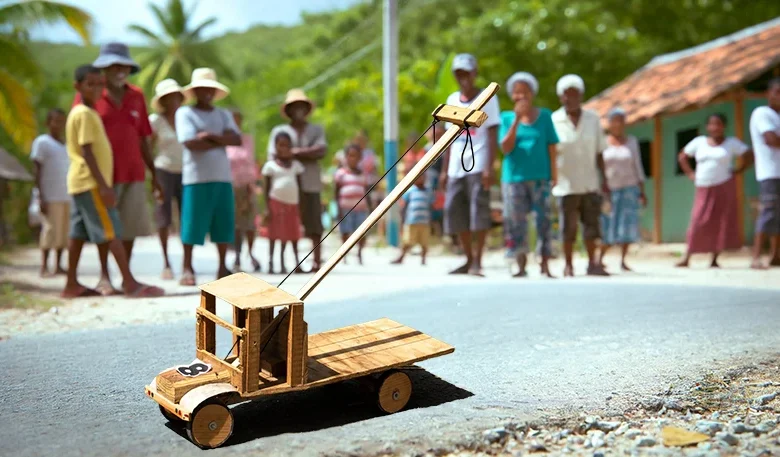Kabouwé – Pushcarts

Kabouwé is a cherished cultural artefact in Dominica, representing play and utility across generations. Historically, Kabouwé referred to different types of carts: the original utility carts used by garbage collectors, vendors, and porters in Roseau and the more playful versions, which were hand-crafted toy trucks made by local children. Kabouwé symbolises Dominica’s creativity, resourcefulness, and cultural heritage today.
Kabouwé’s Lingusitic and Cultural Evolution
In earlier times, Kabouwé – Pushcarts served various roles in Dominica’s daily life. The name Kabouwé applied to:
- Garbage Collection Carts – used for waste removal in the streets of Roseau.
- Fish Vending Carts – two-wheeled carts for selling local catches, such as ‘balaw’ and ‘kayi’.
- Commercial Transport Carts – large, wheeled carts that moved goods from the port along Bayfront.
Over time, Kabouwé became a term for Dominican children’s toys, evolving into popular, locally crafted pushcarts. Building a Kabouwé Pushcart is easy. They are crafted from milk tins, corned beef cans, and wood, allowing children to emulate the carts used daily. The more advanced versions featured steering mechanisms decorated with vibrant colours, adding a personal touch to each creation.
The Kabouwé Festival and Community Bonding
Introduced in 2007 at St. Mary’s Primary School, the Kabouwé Festival became a beloved annual event celebrating the Dominican tradition of Kabouwé toys. These events are in tandem with Creole Heritage Month and, Independence Day and Jounén Kwéyòl celebrations, reinforcing cultural pride.
Kabouwé crafts have also inspired regional exhibits like the Festival of Traditional Games & Toys at Benjamin’s Park in Portsmouth, supported by the Division of Culture and other cultural organizations. These festivals highlight Dominica’s commitment to preserving traditional games and skills, including Kabouwé, for future generations.




